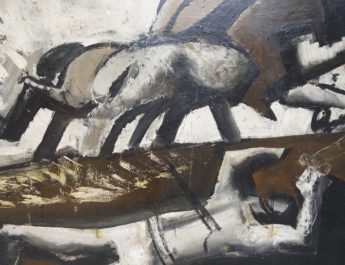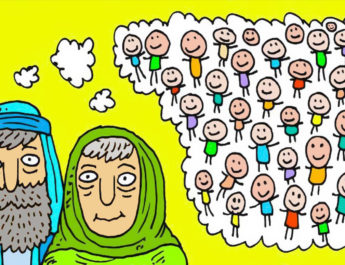Matthew 24:36-44
First Sunday of Advent A
36 “But about that dayA and hourB no one knows,C neither the angelsD of heaven,E
A “day” = hemera. Perhaps from hemai (to sit). This is day, time, or daybreak.
B “hour” = hora. This is a set time or period, an hour, instant, or season. This is where the word “hour” comes from.
C “knows” = eido. This is to know, consider perceive, appreciate, behold, or remember. It means seeing with one’s eyes, but also figuratively, it means perceiving – seeing that becomes understanding. So, by implication, this means knowing or being aware.
D “angels” = aggelos. Probably from ago (to lead, bring, carry, guide) + agele (flock, herd, drove); {also from ago (see above)}. This is angel or messenger. Properly, it is one sent with news or to perform a specific task. This messenger can be human or an angel from heaven. More commonly, it is used for angels in the New Testament.
E “heaven” = ouranos. May be related to oros (mountain, hill) with the notion of height. This is the air, the sky, the atmosphere, and heaven. It is the sky that is visible and the spiritual heaven where God dwells. Heaven implies happiness, power, and eternity.
nor the Son,F but onlyG the Father.H 37 For as the days of NoahI were, so will beJ
F “Son” = Huios. This is son, descendant – a son whether natural born or adopted. It can be used figuratively for other forms of kinship.
G “only” = monos. Perhaps from meno (to stay, abide, wait, endure). This is alone, single, remaining, mere, desolate.
H “Father” = Pater. This is father in a literal or figurative sense. Could be elder, senior, ancestor, originator, or patriarch.
I “Noah” = Noe. 8x in NT. From Hebrew nuach (to rest, calm, camp, free, place, remain, satisfy, settle, station, or wait; implies settling down in a literal or figurative sense). This is Noah, meaning rest.
J “be” = eimi. This is to be, exist.
the comingK of the Son of Man.L 38 For as in the days before the floodM they were eatingN and drinking,O
K “coming” = parousia. Related to “be” in v37. From pareimi (to be present, have come) {from para (from beside, by, in the presence of) + eimi (see note J above)}. This is presence, coming, arrival, advent. Properly, it was the term for an official visit of a king or someone else with formal authority. It is used specifically in the New Testament to refer to Jesus’s second coming.
L “Man” = anthropos. Probably from aner (man, male, husband) + ops (eye, face); {from optanomai (to appear, be seen); perhaps from horao (become, seem, appear)}. This is human, humankind. Used for all genders.
M “flood” = kataklusmos. 4x in NT– all referring to the Great Flood with Noah and the ark. From katakluzo (to inundate, flood over, overwhelm); {from kata (down, against, throughout) + kludon (billow of water, wave, surge of the sea); {from kluzo (to wash over)}}. This is a flood or deluge. It is also where the English “cataclysm” comes from.
N “eating” = trogo. 6x in NT. This is gnaw, crunch, eat, eat a meal.
O “drinking” = pino. This is to drink, literally or figuratively.
marryingP and giving in marriage,Q until the day Noah enteredR the ark,S
P “marrying” = gameo. From gamos (a wedding, whether the ceremony, the feast, or the marriage itself). This is to marry.
Q “giving in marriage” = gamisko. Related to “marrying” in v38. 8x in NT. From gamos (see note P above). This is to give one’s daughter to marry a husband.
R “entered” = eiserchomai. From eis (to, into, for, among) + erchomai (to come, go). This is to go in in a literal or figurative sense.
S “ark” = kibotos. 6x in NT. This is a wooden box or chest. It also refers to Noah’s ark and the ark of the covenant.
39 and they knewT nothing until the flood cameU and sweptV them allW away, so, too, will be the coming of the Son of Man.
T “knew” = ginosko. This is to know, recognize, realize, perceive, learn. It is knowledge gained through personal experience.
U “came” = erchomai. Related to “entered” in v38. See note R above.
V “swept” = airo. This is to lift up in a literal or figurative sense. So, it could mean to lift, carry, or raise. It could also imply lifting something in order to take it away or remove it. Figuratively, this can be used for raising the voice or level of suspense. It can mean sailing off as raising the anchor. It can also correspond to a Hebrew expression for atonement of sin (lift/remove sin).
W “all” = hapas. From hama (at once, together with) + pas (all, every, every kind of) OR from a (with) + pas (see above). This is all; every part working together as a unit.
40 Then twoX will be in the field;Y oneZ will be taken,AA and one will be left.BB
X “two” = duo. This is two or both.
Y “field” = agro. This is a field, whether one planted with crops or on which one pastures cattle. It can also be a piece of land, the country, an estate. This is where “agriculture” comes from.
Z “one” = heis. This is one, a person, only, some.
AA “taken” = paralambano. From para (beside, by, in the presence of) + lambano (active acceptance/taking of what is available or what has been offered; emphasizes the choice and action of the individual). This is to receive, take, acknowledge, associate with. It can also mean to take on an office or to learn.
BB “left” = aphiemi. From apo (from, away from) + hiemi (to send). This is send away, release, permit, forgive, allow to depart, discharge, or send forth.
41 Two women will be grindingCC mealDD together; one will be taken, and one will be left. 42 Keep awake,EE therefore, for you do not knowFF on what day your LordGG is coming.
CC “grinding” = aletho. 2x in NT. – in this passage and in the parallel in Lk 17:35. From the same as aleuron (flour, meal); from aleo (to grind). This is to grind.
DD “meal” = mulos. 5x in NT. Probably from the base of molis (with difficulty, scarcely); from molos (toil); probably akin to mogis (hardly, with difficulty); from mogos (laborious, toil). This is a hand-mill or grinder to use with grain.
EE “keep awake” = gregoreo. From egeiro (to awake, raise up or lift up; to get up from sitting or lying down, to get up from sleeping, to rise from a disease or from death; figuratively, rising from inactivity or from ruins). This is to be or stay awake, watch. Figuratively, it can be alertness or vigilance.
FF “know” = eido. Same as “knows” in v36. See note C above.
GG “Lord” = Kurios. From kuros (authority, supremacy). This is a respectful address meaning master or sir. It refers to one who has control or power greater than one’s own. So, it was also applied to God and Jesus as Master or Lord.
43 But understandHH this: if the owner of the houseII had knownJJ in what part of the nightKK the thiefLL was coming,
HH “understand” = ginosko. Same as “knew” in v39. See note T above.
II “owner of the house” = oikodespote. 12x in NT. From oikos (house – the building, the household, the family, descendants; the temple) + despotes (lord, master, despot; authority who has unrestricted power and jurisdiction) + posis (husband). This is the master of the house, head of a family, or the householder.
JJ “known” = eido. Same as “knows” in v36. See note C above.
KK “part of the night” = phulake. From phulasso (to guard something so that it doesn’t escape – to watch over it vigilantly; being on guard in a literal or figurative sense); related to phulaks (military guard, sentry, watcher). This is the act of guarding, the person who guards, the place where guarding occurs (i.e. a prison), or the times of guarding (the various watches).
LL “thief” = kleptes. 16x in NT. From klepto (to steal secretively). This is a thief that steals using stealth rather than violence. It is a thief in a literal or figurative sense.
he would have stayed awakeMM and would not have letNN his houseOO be broken into.PP
MM “stayed awake” = gregoreo. Same as “keep awake” in v42. See note EE above.
NN “let” = eao. 11x in NT. This is to allow, leave, put up with something.
OO “house” = oikia. Related to “owner of the house” in v43. From oikos (see note II above). This is a house, household, goods, property, family, or means.
PP “broken into” = diorusso. 4x in NT. From dia (through, for the sake of, across, thoroughly) + orusso (to dig, burrow, or excavate). This is to dig through i.e. break into a house.
44 Therefore you also must beQQ ready,RR for the Son of Man is coming at an hour you do not expect.SS
QQ “be” = ginomai. This is to come into being, to happen, become, be born. It can be to emerge from one state or condition to another or is coming into being with the sense of movement or growth.
RR “ready” = hetoimos. 17x in NT. From heteos (fitting, fitness). This is make ready, be ready because of being prepared, standing by, adjusted; ready to meet some opportunity or challenge.
SS “expect” = dokeo. From dokos (opinion). This is to have an opinion, seem, appear, think, suppose. It deals with a personal judgment. This is the root of the word “doxology.”
Image credit: “Awakened Climber, Chile” by Donatun, 2019.




